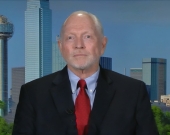Professor Dr. Jeffrey VanDenBerg to Gulan: It is extremely unlikely that the Iranian government will concede to US demands no matter the economic suffering
July 27, 2019
Exclusive Interviews

Dr. Jeffrey VanDenBerg is Chair of Political Science Department Professor of Political Science and Director of Middle East Studies program and coordinator of the Model United Nations program at Drury University. He teaches courses in international relations, foreign policy, and Middle East politics. He is the Director of the Middle East Studies program and. Dr. VanDenBerg's research interests focus on Arab politics and international relations in the Middle East. As a USIA/NMERTP Fellow, he conducted research in Jordan that included personal interviews with Jordan's prime ministers, cabinet members, parliamentarians, and other government officials. In 2012, Dr. VanDenBerg served as Visiting Fulbright Professor of International Relations at the University of Ljubljana (Slovenia). Along with History professor Dr. Shelley Wolbrink, he has directed many Drury study abroad programs to Morocco, Italy, Egypt, and Greece. He is the author of "King Hussein and Black September," and "Generational Leadership Change in the Arab World" (both in the edited volumes History in Dispute: The Middle East Since 1945, Vol. I & II), “Teaching and Learning in Middle East Studies” in Issues in Middle East Studies, and co-author (with Richard J. Harknett) of "Alignment Theory and Interrelated Threats: Jordan and the Persian Gulf Crisis," in Security Studies. His book reviews have appeared in Arab Studies Quarterly and the Canadian Journal of History. Dr. VanDenBerg is a founding member of the Middle East Studies Association’s Committee on Undergraduate Education. In a written interview he answered our questions as the following.Gulan: First of all, your general characterization of the current situation, especially With regard to all these tensions between US and Iran?
- Professor Dr. Jeffrey VanDenBerg: The rising tension between the United States and Iran is extremely dangerous and unnecessary. It is a crisis of sparked by President Trump’s decision to violate the JCPOA by exiting the agreement and imposing unilateral sanctions on Iran. Unfortunately, but perhaps predictably, Iran has responded to US policy by incrementally enriching uranium beyond the JCPOA limits, and taking provocative military action in the Persian Gulf, such as the recent seizure of a UK shipping vessel.
Gulan: some characterize Mr. Trump's administration approach-Maximum Pressure Campaign- with regard to Iran as coercive diplomacy, and others say that it is more coercive that diplomacy? What do you make about that?
- Professor Dr. Jeffrey VanDenBerg: The Trump Administration’s so-called Maximum Pressure Campaign policy is all coercion, with no serious diplomatic elements. The White House has issued demands on Iran that they know Iran cannot accept, and therefore the real goal is to cripple the Iranian regime.
Gulan: It is obvious that the economic pressure imposed by US against Iran has created a great deal of financial troubles and turmoil in that country, so to what extent Iran will be compelled to make painful policy concession, given that these sanction has taken a heavy toll on Iran's economy?
- Professor Dr. Jeffrey VanDenBerg: It is extremely unlikely that the Iranian government will concede to US demands, no matter the economic suffering. Unfortunately, the Trump Administration’s policies have strengthened the hand of hard liners in Iran who opposed the nuclear deal and who advocate for a more confrontational approach to foreign policy. Iran’s strategy is to drive a further wedge between the US and European nations, and seek economic relief from others beyond the US. It remains to be seen, but at this moment Iran’s provocative actions in the Gulf against British interests are likely to backfire. These actions were probably designed to escalate the crisis and spur Europe into action, but they seem more likely to generate sympathy for the American position on Iran. It seems that Iran is taking the US bait.
Gulan: As you know Mr. Trump is pursuing almost pure transnational approach for achieving his foreign policy objectives, but what is interesting or even surprising is that his Administration is insisting on reaching a transformational and comprehensive deal with Iran- after pulling out form the nuclear deal-? So do see any discrepancies in this regard?
- Professor Dr. Jeffrey VanDenBerg: As I mentioned above, the Trump Administration isn’t serious about reaching a new deal with Iran. Rather, it is intended to give the impression that they are open to diplomacy, when in fact they know well they are presenting terms that no Iranian government will accept.
Gulan: what should be done or could be done in order to defuse the tension and deescalate the situation? Or these two countries are inevitably on the collision course? Especially after Iran has declared it has reduced its compliance to the commitments of the nuclear deal?
- Professor Dr. Jeffrey VanDenBerg: The best one could hope for is that President Trump’s personal aversion to a new American military commitment overrides his hawkish advisors such as National Security Advisor John Bolton. And, that Iran refrains from taking actions that could be used by the US as justification for military action. Seizing of tankers, sending aggressive drones into international waters, and other actions by Iran give ammunition to American advocates for conflict, and are counterproductive in terms of keeping European support for the JCPOA.
Gulan: On the other hand Mr. Trump administration has revealed some aspects of its so called Deal of the century, and obviously it is heavily and overwhelmingly relies on economic reward –so to speak-, so to what extent this approach for conflict resolution and transformation will be effective and successful?
- Professor Dr. Jeffrey VanDenBerg: The so-called “Deal of the Century” will not do anything to de-escalate tensions with Iran. Quite the opposite, since the primary goal of the “plan” is to remove the Palestinian issue as an obstacle to greater cooperation between Israel and many Arab states (led by Saudi Arabia) in confronting Iran.















